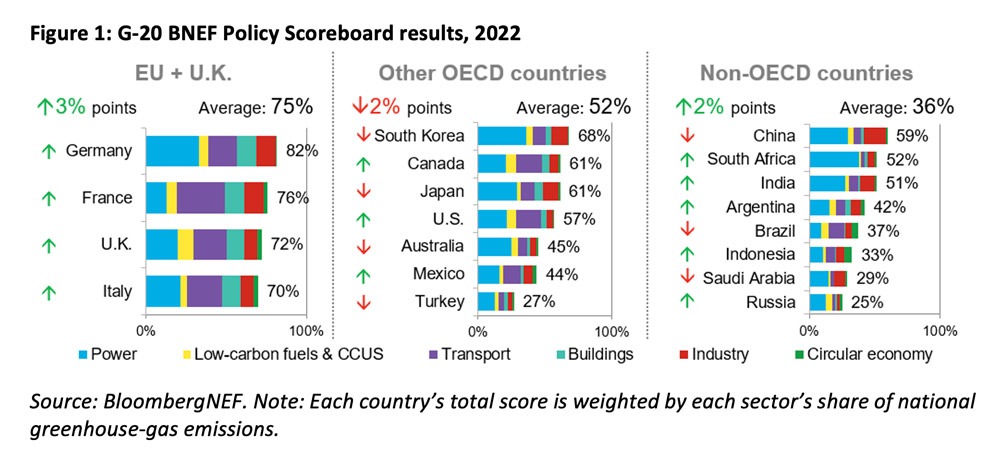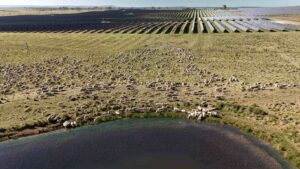Australia has yet again found itself ranked among the most recalcitrant nations when it comes to implementing climate change policies, earning a fail-grade in a new BloombergNEF assessment that found Australia was one of the few nations that actually went backwards in the last year.
In a new assessment of the ‘zero carbon’ policies implemented by G20 countries, analyst firm BloombergNEF gave Australia a score of 45 per cent for its climate change policies, a score mostly underpinned by policies that have driven the uptake of renewables (and which had been set by a previous Labor government).
BloombergNEF scored countries across six criteria, including decarbonising the electricity sector, transport, buildings, and industrial sectors. Countries were also scored on their adoption of zero emissions fuels and support for expanding the circular economy.
Australia’s score pointed to deficiencies across almost all areas of policy, including the decarbonization of transport, buildings, industrial energy use and recycling.
Australia was one of just three G20 members who are also members of the OECD that saw their scores fall over the last 12 months. The others were Japan and Turkey.
“The bottom-ranking countries have not made much progress. Australia and Turkey took the biggest tumble mainly due to rising greenhouse-gas emissions, coal fleet expansion plans, and unambitious renewables and fossil-fuel policies,” the assessment says.
The only other G20 members that saw their scores decline were Saudi Arabia, China and Brazil.
European countries generally topped the list, with Germany, France, the United Kingdom and Italy all recording scores of 70 per cent or higher.
It sees Australia rank well behind its international peers and major trading partners, including the United States (57%), China (59%), Japan (61%) and the United Kingdom (72%).
Germany received the highest policy score at 82 per cent, while Russia received the lowest overall score at 25 per cent.

G20 countries are collectively responsible for around 80 per cent of global greenhouse gas emissions and consists of some of the world’s largest economies.
BloombergNEF’s assessment found that, overall, G20 countries made positive progress towards tackling climate change, strengthening their collective policies over the last year, but found that policies are still falling short of the promises made in forums like international climate talks.
Michael Bloomberg, who currently serves as the UN Secretary General’s Special Envoy for Climate Ambition and Solutions, said the results showed that G20 countries needed to significantly strengthen their climate policies, to ensure they achieve a level of action that matches their rhetoric.
“Words only matter if they’re backed up with action – and the dangerous reality is, none of the G20 countries are delivering the emissions cuts they’ve promised fast enough,” Bloomberg said.
“Russia’s actions in Ukraine have brought new urgency to the push for clean energy, and it has been encouraging to see countries recognize the need to speed up their plans because we don’t have a moment to waste.”
“This report helps to provide transparency into countries’ progress so that the public can hold leaders accountable, and highlights policies governments can deploy to reach and exceed the pledges they’ve made.”
The scathing assessment for Australia saw it score particularly poorly for the decarbonization of the transport sector, which BloombergNEF attributed to a lack of meaningful national policies to support the uptake of electric vehicles.
“The G-20 leaders for public charging network growth and number of connectors per population are China, South Korea, Italy, Germany, France and the U.K. This is partly due to government support and partly because some countries (China and South Korea) have a higher prevalence of apartment buildings and less access to home charging,” the report says.
“Public charging networks in countries such as Australia, India and Japan have seen less investment due to the lower uptake of EVs, which has led to slower network growth.”
See our recent stories on our EV-focused sister site The Driven: Look who’s ruining the weekend now why it’s so hard to buy an electric car and Myopic and dogmatic: Morrison blamed for lack of electric vehicles.
Last week, Australia was singled out for criticism by UN secretary general Antonio Guterres, who described Australia as a “hold out” for failing to adopt stronger emissions reduction targets.
Australia has consistently ranked well below international peers on assessments of climate change policies, including being ranked dead last in an assessment of all 193 UN members for climate policies by the UN-backed Sustainable Development Solutions Network.










